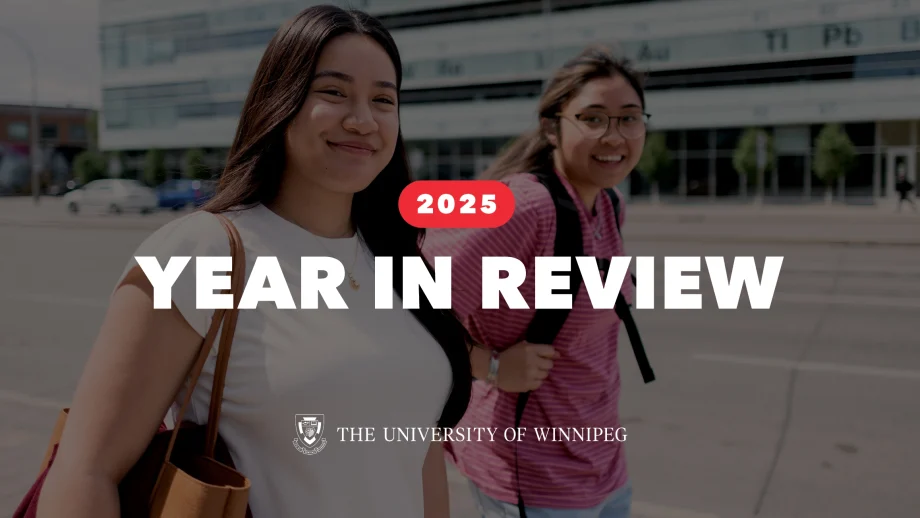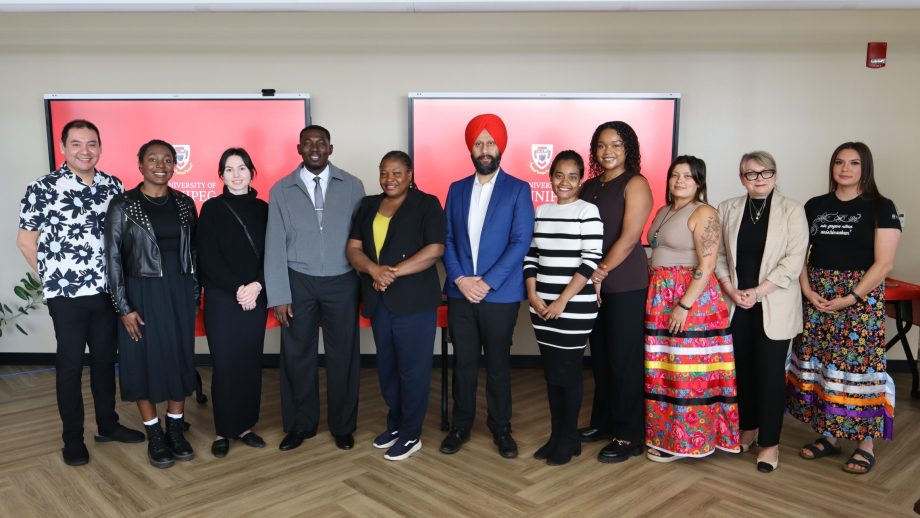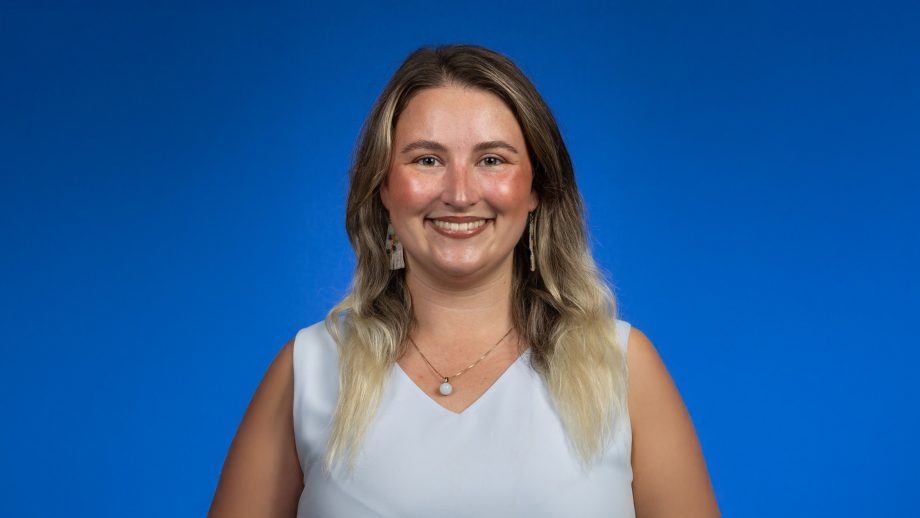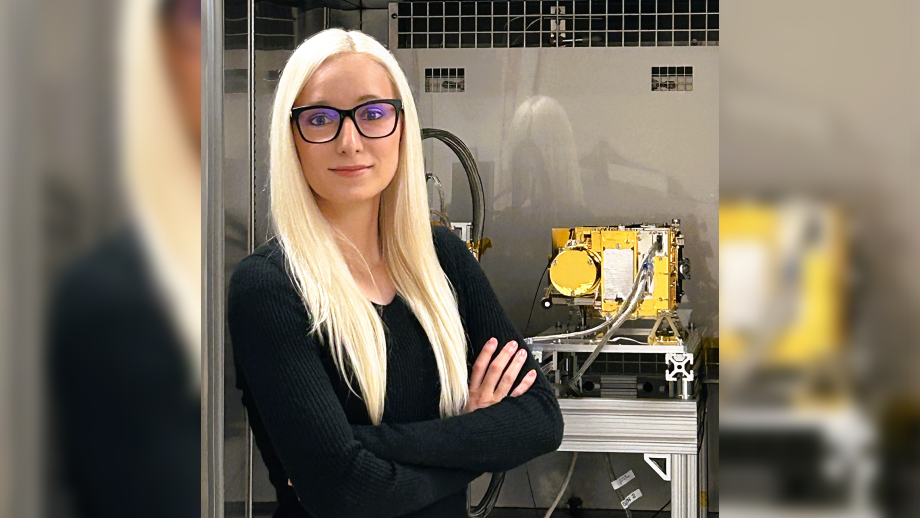Indigenous students at The University of Winnipeg who are curious about graduate studies gathered at The Leaf in Assiniboine Park on April 28 for the opening ceremony of the 2025 Indigenous Summer Scholars Program (ISSP).
Eleven student scholars and 14 faculty research mentors are participating in this year’s ISSP.
ISSP is a 12-week paid summer research program that engages Indigenous students in their third or fourth year of undergraduate study in mentored research projects while they explore the possibilities of graduate studies.
“ISSP is one of most meaningful things we do in the Faculty of Graduate Studies,” said Dr. Kyle Devine, Professor and Dean of Graduate Studies. “Now in its ninth year, we will soon have over 100 students who have completed it. Seeing all the ways the program helps strengthen pathways for Indigenous students to move into advanced study—and, ultimately, into leadership in the academy and society—is a tremendous source of inspiration for our graduate students and the wider UWinnipeg community. A big welcome to this year’s ISSP participants!”
ISSP is one of two Indigenous Pathway Programs at UWinnipeg. The four-week Pathway to Graduate Studies (P2GS) program, which focuses on STEM research opportunities, is the other.
As the opening ceremony began, Dr. Chantal Fiola, Associate Vice-President, Indigenous Engagement, congratulated the scholars on embarking on a summer of academic growth. Elder Sharon Pelletier brought prayers and teachings and opened a sharing circle that gave scholars and mentors an opportunity to discuss the applied research projects they will undertake, culminating in a July colloquium. Weekly workshops and events are also planned.
This year’s cohort of scholars are a diverse group, with majors ranging from Biochemistry to Psychology. Research topics span everything from the neuroimaging of humour perception to the parasite ecology of Manitoba.
Examining curatorial spaces
Em Penner, an Indigiqueer Cree and Anishinaabe person who recently completed a four-year Bachelor of Arts with a Rhetoric and Communications major and a Psychology minor, is one of this year’s ISSP scholars. Penner will be mentored by Dr. Angela Failler, Professor and Canada Research Chair in the Department of Women’s and Gender Studies, and Dr. Heather Milne, Professor in the Department of English.
I hope to build lasting relationships with Indigenous scholars, learn more about our cultures, and help inspire other Indigenous and Indigiqueer folks that we deserve to be in this space.
Em Penner
“I chose UWinnipeg for the smaller class sizes and diverse community,” said Penner, whose academic research explores Indigenous queer identities and representations.
“I wanted to enroll in ISSP for the cultural engagement and promotion of Indigenous bodies in academic research,” they explained. “Incorporating Indigenous methodologies and cultural and community programming is an incredible way to decolonize Western academia and recognize the unique experiences and supports for Indigenous students and scholars to thrive.”
Penner’s research project, entitled “Museum Queeries,” focuses on Indigenous queer representation in local curatorial spaces such as museums, galleries, and archives.
“I hope to explore Indigenous queer representation at the Manitoba Museum, WAG-Qaumajuq, and UWinnipeg’s Two-Spirit Archives,” Penner said, “to highlight the necessity of centring these identities in curatorial spaces for Indigenous resurgence using a podcast to broaden the accessibility of my research.”
Penner hopes ISSP imparts not only academic advancement, but also relational development.
“I hope to build lasting relationships with Indigenous scholars, learn more about our cultures, and help inspire other Indigenous and Indigiqueer folks that we deserve to be in this space,” they said.
Exploring the carceral system
Cody Duff, another ISSP scholar, is currently entering his final year of bachelor’s degree with a double major in Political Science and Philosophy.
“I wanted to enrol in ISSP in order to strengthen my knowledge of research methodologies as well as further my ability to communicate and gain knowledge in areas that I have not previously focused on,” he said.
Duff possesses not only academic experience, but considerable workforce experience as well.
“I wound up at the University after working as a chef and, later, in residential construction,” he explained. “My passions include social justice issues concerning identity, race, or sex.”
Duff will be mentored by two faculty members in the Department of Criminal Justice: Assistant Professor and Honours Chair Dr. Alex Tepperman, and Associate Professor Dr. Bronwyn Dobchuk-Land.
Duff’s research project, “The Prison Speaks: Analyzing the Presentation of Manitoba’s Carceral Institutions,” takes an ethnographic approach to the carceral system and its effects on select communities. Amid the continued ripple effects of settler-colonialism, the project will examine phenomena such as public frustration with police outreach when calls for aid are ignored, and the aesthetics of carceral spaces across Manitoba.
“We hope to provide a space of sorts for those affected by carceral violence to voice their concerns,” Duff said.
More information on the Indigenous Summer Scholars Program and the 2025 cohort of scholars can be found on the ISSP website.






